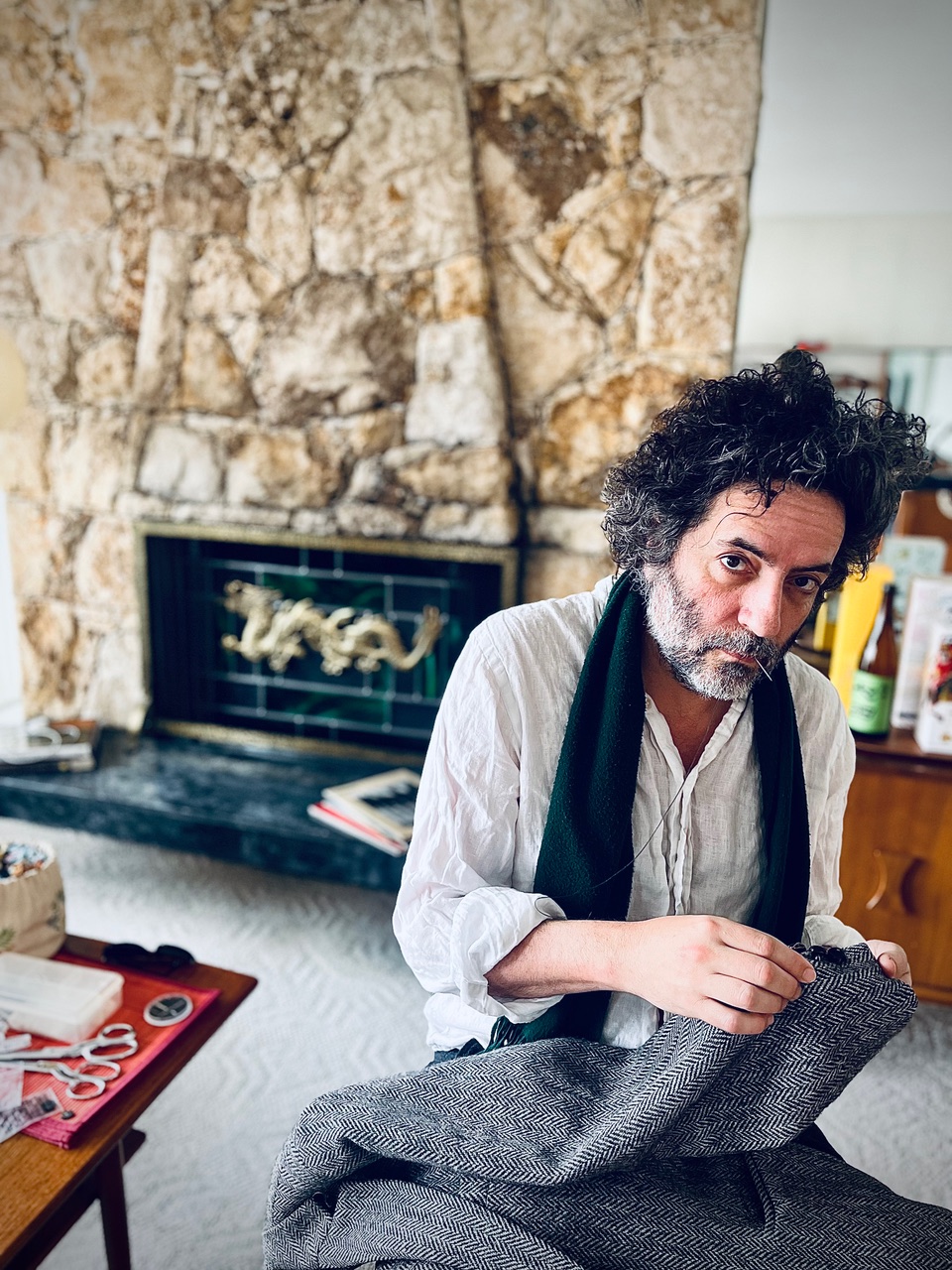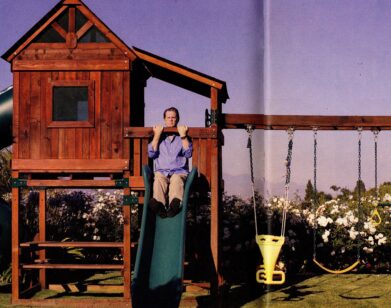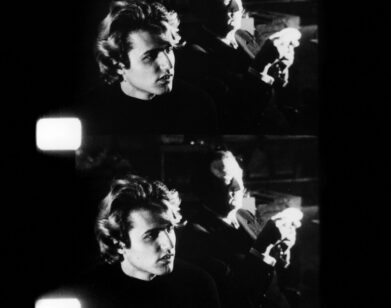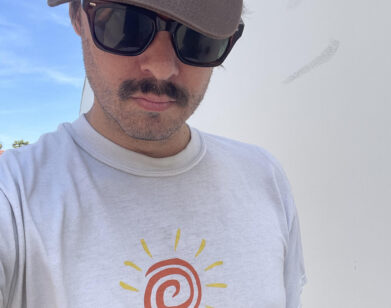Tinnitus
Dan Bejar and Jessica Pratt on Chronic Angst, Precious Instruments, and Occupational Hazards
Desroyer’s Dan Bejar first saw Jessica Pratt live sometime in 2014, when the folk singer was passing through Vancouver on tour. Bejar, by his own admission, was too shy to introduce himself, but he’d later strike up an email correspondence with Pratt after falling ill with pneumonia. “I listened to your record a lot from a hospital bed,” he said when the two got together on Zoom earlier this month. Now, almost a decade later, Bejar is getting ready to drop his 14th Destroyer album: Dan’s Boogie, a breakthrough record born in part from the musician’s resolution to play more piano. “At some point,” he quipped, “the sound of me playing guitar started bumming me out ’cause I’m bad at it.” Below, the two have a wide-ranging conversation about their shared obsessive-compulsions, the pleasures and perils of life on the road, and, of course, The Rolling Stones.
———
DAN BEJAR: Hey.
JESSICA PRATT: Hello. [Laughs] Sorry, we just spoke at the same time.
BEJAR: How are you feeling?
PRATT: I’m feeling good. Once I get sick, my voice just kind of takes a licking. It takes three weeks for it to be normal again. How’s your vocal sturdiness? Can you thrash and rash on tour and just keep singing?
BEJAR: I totally forgot that I used to, without fail, lose my voice on tour for about 10 years straight.
PRATT: Wow.
BEJAR: In the 2000s I was just going for it. I would sing loud and just not take care of myself on tour, but I’ve had pretty good luck in the last few years.
PRATT: I’m glad to hear that.
BEJAR: I think I seem pretty quiet now compared to how I used to be.
PRATT: Yeah, and that’ll definitely help you preserve yourself. Are you a big chatter on tour, always talking, or are you hanging in the back?
BEJAR: I would have to ask someone that. I probably do a bit of sullen, quiet pacing before the show, ’cause I still get nervous. Then when the show’s actually done, I’m a real chatterbox because I’m just ecstatic that I got it over with. Is it kind of the same for you?
PRATT: Yeah, it’s the same. I now try to intentionally not speak for as much of the time as I can, which I’ve been advised to do by professionals. I tend to live in a permanent state of dread on tour.
BEJAR: It makes it sound like being on stage is a horror, but it’s not. There are moments of special elation, but I don’t get those all the time. I chase after them. You think after 30 years I would loosen up a bit, but I’ve still got the anxiety.
PRATT: That is disconcerting to hear.
BEJAR: Well, just ’cause I’m static doesn’t mean there’s no hope for others. You seem pretty loose on stage these days. I’m trying to think back to when I first saw you play, but it’s hard to say.
PRATT: I have a memory of you being at a show in, I’m assuming Vancouver, in 2014 or really early 2015.
BEJAR: Yeah, you were touring with Kevin Morby. I thought the show was really good.
PRATT: I didn’t really have my shit together at that point. I was treating shows as an afterthought. I liked making music and recording music, but I just didn’t want to be bothered. Now my relationship with [live performance] has completely changed. I don’t think we spoke at that show though. I remember talking to Carey and then you were sitting on a bench in the background.
BEJAR: I was probably really shy. That sounds like me. But I think we had exchanged emails, ‘cause I remember being on tour in Europe and getting super sick and ending up in the hospital. I think it was around the time that your second record came out.
PRATT: Yeah, I wrote to you about a gnarly tour I had been on and that I was listening to your records and they were helping me, as always.
BEJAR: I listened to your record a lot from a hospital bed.
PRATT: I’ve never gotten pneumonia on tour. That sounds really horrible. Have you mastered the art of sleeping on the bus yet?
BEJAR: Even if you drink or drug yourself to sleep, it’s still fake sleep. You don’t realize how truly exhausted you are until you come home and you’re like, “Oh, I haven’t actually truly rested in a month.” You’re under siege in your little bunk. I’m sure all buses are not created equal. There’s probably very luxurious versions, but we usually travel on what’s probably an old roadie bus.
PRATT: It can get pretty luxurious, but at a cost. I hope those kinds of buses are in my future at some point. Would you still rather do that than the van-to-the-hotel situation?
BEJAR: There’s just so many of us. We had that in Destroyer’s past, but everyone’s too old. We can’t do that anymore.
PRATT: You got to have some dignity.
BEJAR: We have so little, so we have to cling to what little there is.
PRATT: Are you at home right now?
BEJAR: I’m at home, yeah. I got home from that Father John Misty tour a week ago.
PRATT: Right.
BEJAR: It feels like a long time ago already.
PRATT: It’s funny how that happens.
BEJAR: What about you? Are you chilling for a while or…?
PRATT: No, I’m not. Well, I have been sort of chilling. I did a big tour in November of last year, and then December through now I’ve been off but still traveling a lot for some reason. And I’m about to head out on the road next week for two weeks or something, but then I’ll be back for a while. I’ve been touring so consistently over the last 10 years, aside from the pandemic, and I have to say that I just don’t yearn to go elsewhere.
BEJAR: It’s interesting, isn’t it? When people tell me about their trips, I either glaze over or I just can’t believe what I’m hearing.
PRATT: You’re like, “Why would you do this?”
BEJAR: I travel to see family. I’ll try to go to Spain every once in a while to see people. That’s about it.
PRATT: That’s nice. As a fan, I have some questions that I wanted to ask you.
BEJAR: You didn’t need to come up with talking points.
PRATT: Well, it’s a rare opportunity to ask you some questions. I read that in 2008 or ’09, you said that you kind of shifted away from traditional guitar-based songwriting and that you started engaging in something that you described as “mumbling and melodies,” little bits of words coming at the same time. It seems like a revelatory thing for someone to have this major transition in how they write. I’m wondering how conscious you were of that.
BEJAR: At some point, the sound of me playing guitar started bumming me out ’cause I’m bad at it. It would shut down any urge to create anything. If the sound you’re making is disappointing to you and the opposite of what you hear in your head, it’s tough to want to dive into it. I probably stopped listening to music that had a ton of electric guitar in it, so maybe that had something to do with it. I just stopped playing, and once I stopped playing, I stopped picking it up to write. Once I stopped picking it up to write things, things got more freeform.
PRATT: It became this process of writing words and having a melody in mind?
BEJAR: It’s changed a bit since then, but during that big shift, it was words showing up that you would sing. The fact that you could sing them meant that they were good. Then I would string them together. Then, I would be forced to sit down at some crappy midi synth thing and place as few chords as I could underneath the melody.
PRATT: Yeah, to give the basic gist.
BEJAR: The idea was also like, “I’m into ambient music and I want to erase chords,” and I didn’t know how to do that. I still don’t, but it seemed like an easier thing to do on a synthesizer, especially since I don’t really know chords on the piano. I just kind of feel them out.
PRATT: I’ve had experiences where I hear something in my head and feel like if I could play piano, I could orchestrate something. It’s an interesting thing to feel stagnated by your lack of musicianship, but also not really do anything to change that.
BEJAR: I also started picturing myself on stage singing. Not that that’s a persona, but you start writing towards whatever image you have of the person singing. Not that I was full on Lizard King, but in my head I probably was, right?
PRATT: Yeah, but even to have that sort of aspiration is interesting.
BEJAR: I kind of ditched it though. Now, I wish I knew incredible jazz chords on the piano.
PRATT: But then you have these very talented people that seem to be dedicated to being at your disposal for years at a time. It sort of makes you feel mad with power, or maybe you still feel like you can’t quite get at what you were thinking,
BEJAR: I don’t know. I’ve never really come close to getting the idea. It always turns into something different. Do you find that?
PRATT: Yeah.
BEJAR: I picture you more like Stanley Kubrick, an incredible and exacting vision which you then just enact.
PRATT: That’s very kind of you to say.
BEJAR: But that’s not how it goes down?
PRATT: We both have obsessive compulsive disorder, so we have that in common. But yeah, I demo songs in an extremely crude manner, just iPhone recording, usually in a bathroom or somewhere with natural acoustics. The performance tends to be pretty much exactly what happens on the record in terms of my guitar playing and singing. The big mysterious thing is the production, and then the arrangements on top of that can change things to a considerable degree, sometimes more than I would’ve thought possible. And I’ve only really been doing it that way for the last two records.
BEJAR: That’s what I thought. Are you fetishistic about any gear at all? Is there a microphone where you’re like, “That’s the one that understands my spirit,” or some guitar or something?
PRATT: I have attachments to certain things. I play this little guitar. It’s not like a ukulele or anything like that, it’s just a half-size guitar. It’s easy to play coming from a big thick nylon, which can be very cumbersome, especially since I have small hands. It’s weird to write a song on a guitar and then play it on a different guitar. On the last record, the engineer that I worked with was like, “Why don’t you just use that guitar?” I was like, “Well, this thing is a piece of shit, so I can’t.”
BEJAR: Well, it sounds good. I love little guitars like that.
PRATT: I like it too. It’s got a good sound. In the wide world of nylon string classical guitars, it’s really hard to suss out. Price does not necessarily equal a sound you like.
BEJAR: That world’s a mystery to me.
PRATT: It’s completely weird. You’ll pick up a $1,000 nylon string guitar at a shop and it’ll just sound super plastic-y. I hold on to the ones that I like, and that feels sort of superstitious.
BEJAR: No, it’s smart.
PRATT: Has anyone ever approached you about a book of your collected lyrics?
BEJAR: Someone actually made their own rogue version of that. It was a bound book that someone gave me. They made a few of them. I don’t think there were even. I was like, “How much did it cost to make these if you’re making so few?” But it was a total stranger, and we didn’t really speak.
PRATT: Is this selected works or is it your complete collection?
BEJAR: I can’t even remember. It’s a big book. The only other thing I’ve been approached for was some psycho who wanted to do a biography. This was maybe 15 years ago.
PRATT: I think that’s warranted.
BEJAR: I was like, “You got the wrong guy.” Then, after Kaputt came out, an actual literary agent came out of the woodwork and was like, “What do you got?” I pitched some pretty funny things in a way that probably felt like I was just trying to make fun of him, but I wasn’t. In general, I find when I look at Destroyer writing stuff, I’m not quite sure how it exists on the page or if it speaks to people who are into poetry.
PRATT: I guess that’s part of the problem.
BEJAR: I haven’t gotten that much validation.
PRATT: Really?
BEJAR: Yeah, since I don’t really roll in that world, I don’t really know if it’s good or not.
PRATT: But you’re lauded as a very literary and accomplished lyricist.
BEJAR: Yeah, but I don’t know what it amounts to you when you look at it and read it. I definitely see the music as providing a lot that is missing from the writing itself. I’m not too interested in fleshing things out that way, but it’s confusing to me.
PRATT: You’re a rare breed in the sense that your lyrics to me stand on their own, but you’re also very gifted with phrasing and the way that you position the words within the music. It’s kind of like a [Bob] Dylan thing. Dylan is an amazing writer, but if you think about a song like “Idiot Wind,” the emphasis on those words is almost as important as the words themselves. I can’t imagine reading the lyrics without ever having heard the song.
BEJAR: I find Mark E. Smith to be an incredible writer, one of my favorite writers in the English language, and yet the first thing in my head when I read his words without the music is his phrasing. It’s almost half of the writing.
PRATT: It’s an insane skill. It can’t really be learned. Do you know what the scariest music you’ve ever heard is?
BEJAR: I’m not too scared by music these days, aside from my really bad tinnitus. Stuff that physically hurts me qualifies as scary.
PRATT: Certain things are painful to hear?
BEJAR: Yeah, my ears are pretty sensitive to—this sounds funny—breaking glass.
PRATT: I love the sound of breaking glass.
BEJAR: I kind of love the sound of breaking glass too, which is a total bummer, ’cause now I have these damaged ears.
PRATT: I’m very sorry. I assume this has come from a lifetime of rock and roll.
BEJAR: I did it to myself. There’s no one to blame.
PRATT: It’s unavoidable.
BEJAR: The one time I tried to complain about it to the band they’re like, “What? You’re just getting that now?”
PRATT: It’s like being a blacksmith or something. It’s an occupational hazard.
BEJAR: It really is. Have you ever seen The Rolling Stones?
PRATT: I have not seen The Rolling Stones. I’m a big Stones head. When I was a teenager, I’d say 13 to 17, I was just completely, deep-dive obsessed. I know that you’re a big Stones fan.
BEJAR: Your music to me is Stones-y. That’s one of the reasons why I ask.
PRATT: Really? Nobody has ever said that in the history of mankind.
BEJAR: Well, they’re not listening closely enough.
PRATT: That means a lot coming from you. I am a super Stones head.
BEJAR: It hasn’t died down?
PRATT: These things come in seasons. I think after my big crazy teenage explosion, I took a lot of time off. But it’s a perennial interest that will always be there.
BEJAR: I don’t predict it going away. I feel like their stock is the lowest it’s ever been.
PRATT: Really?
BEJAR: I don’t know. They just haven’t seemed to capture the Gen Z imagination the way other classic rock bands have.
PRATT: That is actually a good observation.
BEJAR: I could be wrong. But as an outsider, that’s what it feels like.
PRATT: It seems like they’d sooner jump into Pink Floyd’s Meddle.
BEJAR: It seems like Zeppelin, Floyd, Fleetwood Mac, The Beatles, Queen, all that stuff.
PRATT: Imagining hearing the Stones without any real context, I could see why some people would be like, “This sounds like shit.”
BEJAR: Yeah, it’s kind of messy.
PRATT: I think the rawness was a big part of the appeal back then, but actually this thought occurred to me the other day. Some Stones song was on the radio, “Brown Sugar” or “Gimme Shelter,” and it’s just crazy that this is a big hit on the radio.
BEJAR: I think you’re right. A good chunk of a song is usually just shambles, which is so cool, but…
PRATT: They’re one of the few bands that did that. Would you be spooked if you met Keith [Richards] or something?
BEJAR: That would be pretty strange. Slightly larger than life.
PRATT: I think people are afraid to meet you.
BEJAR: That’s pretty strange, though. I clam up around strangers and definitely am a bit like a deer in headlights on stage.
PRATT: Well, people are quick to interpret a non-enthusiastic response as negative.
BEJAR: Yeah, I think so. Plus, I’m from Canada, so I’m hard to read.
PRATT: Do the Canadians keep to themselves?
BEJAR: Because we still have more of a tie to England, we’re maybe colder and more reserved. I think that’s just more of a Pacific Northwest thing than a Canadian thing.
PRATT: I can see that. I have a weird amount of Canadian friends in L.A., and they all hang out together and it’s like Fraggle Rock. They’re all very friendly and super sweet. None of them have jobs. They’re all just hanging around playing the guitar and stuff. They’re lovely.
BEJAR: I kind of say it half-jokingly, but I don’t see myself as very Canadian anyway, so I don’t think that’s an excuse.
PRATT: Why not?
BEJAR: My mom is from L.A. and my dad was from Spain and I don’t have any family here. I don’t have deep Canadian roots.
PRATT: Do you like living in Vancouver?
BEJAR: I was born here, but I’m not pro- this city. I have it in me to be against whatever city I live in, but I think that’s healthy. I’m dug in pretty hard and I don’t know where else to go.
PRATT: I have a similar relationship with L.A. I love it a lot, but there are also drawbacks. At this point, I can’t really envision how I would disentangle myself.
BEJAR: If one was to listen to your records, it sounds like someone living in exile.
PRATT: I appreciate that.
BEJAR: I was thinking to myself, “I wonder if Jessica could picture herself not living in America.”
PRATT: First off, Los Angeles is an exile. It’s one of the most isolated places. You can die in your apartment and no one would know for two weeks.
BEJAR: That’s very true.
PRATT: There’s not a lot of foot traffic. No one will fuck with you if you don’t want to be bothered, which I like about it. But yeah, I would live elsewhere. I am weirdly, accidentally patriotic, in the sense that I like being in the States. I feel comfortable here, but if I could stay somewhere long enough to acclimate, I could be down. That would be more of a solitary pursuit, ‘cause you wouldn’t want to drag your family to wherever else.
BEJAR: I wouldn’t want to be responsible for having dragged them to some life that ends up being really solitary and shitty.
PRATT: To your exile point, if you can achieve some convincing atmospheric quality from anywhere, that’s just as good as actually putting that space into the music.
BEJAR: I think you’re right. I wouldn’t actively go somewhere and think that was just going to magically show up in the record that I make. That’s not really how it works.
PRATT: It often doesn’t. Everyone wants it to be like the Exile on Main Street experience, and it really does not work that way. I almost feel like the more mundane my situation is, the better the results are.
BEJAR: I’m the same way. I need idleness and a certain degree of—
PRATT: Mental quiet. You said somewhere that you find it hard to read on tour, and I feel like it’s a similar psychology of anything on the horizon is this distraction that you have to prepare for.
BEJAR: Tour has gotten to the point where it’s just like, I can’t actually do anything. Everything leading up to the show is just kind of this negative space.
PRATT: This sounds like anxiety to me.
BEJAR: Yeah. It’s a constant, low-level anxiety that’s actually only relieved once the show’s happening and then once it’s done. So it’s really hard to read. The idea of doing creative things while on tour seems completely baffling to me.
PRATT: I know. Some people write songs on the road, but I’m held captive. I’m just watching the clock tick. But I’ve recently started forcing myself to read on tour. It’s not easy and I can’t always stick to it, but it’s something.
BEJAR: I was planning on doing that. I did this Misty tour and I packed a 1,300-page experimental novel that I’m really into. I can’t seem to read more than one page every two days.
PRATT: That sounds like the hardest thing to read on tour.
BEJAR: It was a real rookie move. I couldn’t believe what a misfire it was.
PRATT: It seems aspirational.
BEJAR: I respect my intentions, but I also just do not respect my lack of knowing myself.
PRATT: You’ve got to get a bestseller in there—an airport novel or something, ’cause you like Michael Mann movies.
BEJAR: I really do.
PRATT: Is there a novel equivalent?
BEJAR: Well, I like spy movies. I was like, “Maybe I’ll try reading a John le Carré book.” They’re supposed to be really good, but I don’t know where to start. I’m also really bad with character and plot-driven things.
PRATT: What do you mean by “bad”?
BEJAR: I don’t care what happens next and I don’t care why people do things. I just want to be constantly blown away by incredible sentences, one after the other.
PRATT: Well, I wish you luck.







